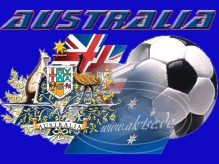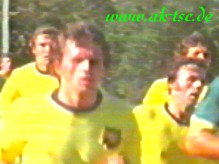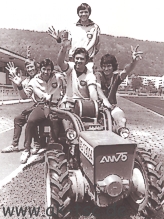
A few weeks before the Finals, Rale had to name 40 players, from whom he had later to select his 22-man squad. These players were:

Goalkeepers:
Jim Fraser, Jack Reilly, Jim Milisavljevic, Allan Maher.
Defenders:
Col Curran, Ivo Rudic, Manfred Schaefer, Doug Utjesenovic, Johnny Watkiss, Peter
Wilson (captain), Harry Williams, Steve Perry, McGinn, George Harris, Col Bennett, Mike
Pye, Bobby Russell.
Midfielders: Jim Mackay, Ray Richards, Jimmy Rooney, Dave Harding, Johnny
Warren, John McDonald, Bourne, Ian Marshall.
Forwards: Adrian Alston, Atti Abonyi, Branko Buljevic, Ernie Campbell,
Garry Manuel, Peter Ollerton, Max Tolson, Terry Butler, Billy Vojtek, Billy Rogers, Johnny
Nyskohus, Mike Micevski, Ray Pocock, ? Steele.
Bobby Hoog had sadly missed out in being named in the 40. He
would have been a certainty in the squad but he broke his leg in a club game in a tackle
with his national room-mate Ernie Campbell. Bobby worked hard to regain fitness, but he
never really recovered.
Before the team travelled to Europe, Rasic had to
make the hard decision to prune this initial squad to just 22 players. Young forward Terry
Butler and great defender George Harris were not on Rasic's final list. Many people said
it was a mistake to have Harris stay at home. He had been in the team for a long period of
time and was unlucky not to make the final selection. Harris was the brother-in-law of
Doug Utjesenovic and it was Utjesenovic who won the battle for the right back position.
Rasic
had chosen three 'keepers for the Cup, Reilly, Maher and Milisavljevic. It was a
disappointment that one of the real heroes of the qualifying campaign, goalkeeper Jimmy
Fraser, decided to pull out of the squad.
Rasic had promised Jack Reilly the number one goalkeeping spot in the side at the
Cup, even though Reilly had been unable to play in any of the qualifying matches.
Fraser was understandably upset and decided to stay at home
and concentrate on his security business. The German papers published a story that Fraser
had to stay because he had been unable to find anyone to take care of his German Shepherd
dogs, but that was never the real reason why he withdrew.
Keeper Ron Corry was also not included. After
performing heroics during key qualifying games, he was one of the last names left off the
squad list for Germany by Rasic. "We were training three times a day, and at my age I
guess it was a bit too much for me," Corry said. "I lost a bit of form, but I
still thought I was going to get picked. Unfortunately it wasn't meant to be."
Billy Vojtek was omitted from the 22-man
squad too, rumoured to be because of troubles with Rasic.
"Rasic told me I would definitely be in the World Cup squad. I had nightmares
for days, you dream about it all your life. I was so close, yet so far away," said
Vojtek. The same was said about Jimmy Armstrong, top scorer of the season.
But the biggest talking-point for the home media was about Pan Hellenic players
Gary Manuel, Ivo Rudic, and David Harding. Rasic was also the coach of Hellenic, and
perversely, the New South Wales Championship season was to continue at the same time as
the World Cup. In no other country was that possible. However, a club would have a
six-week break during the World Cup, if they had three or more players to the national
team. Many said that Rasic chose these Hellenic players - who were never regular first
team members - only to get the season break for his own club.
 But the biggest loss of course was Ray Baartz,
one of Australia's best players ever.
But the biggest loss of course was Ray Baartz,
one of Australia's best players ever.
The whole country had hoped that Baartz could come back for the Cup, but the time
to regain fitness from the injury sustained in the game against Uruguay was too short for
Australia's vice-captain. Baartz never recovered and was forced to retire aged only twenty
eight.The ASF's decision to bring Baartz to West Germany as a member of the official party
however was a stroke of genius for team morale.
For Johnny Watkiss and
Johnny Warren, who both played in three World Cup campaigns, it was a highlight to be in
the team. So, too, for Max Tolson. Rasic said that these three players were nearing the
end of their careers, but as a gesture for their long service in the Socceroos, Rasic took
them to the final party. Warren was not happy not to go as captain, but after his injury a
couple of years before, he had not been a permanent member of the first team.
The coach has to make the last decision,
that's why they call him the Boss.
Here are the 22 men who travelled to a World Cup Final for the first time in Australian
Soccer:
 |
 |
 |
 |
 |
 |
 |
 |
 |
 |
 |
 |
 |
 |
 |
 |
 |
 |
 |
 |
 |
 |
 |
 |
 |
Officials:
Sir Arthur George (Head of Delegation), Brian Lefevre (Chief ofAdministration), Rale Rasic
(Coach), Les Scheinflug (Assistant Coach), John Barclay (Team Manager),
Peter Van Ryn (Physiotherapist), Dr Brian Corrigan (Medical Officer), Eric Worthington
(Director of Coaching),
John Burgess (Team Psychologist). As a guest: Ray Baartz.
ON THE ROUTE TO WEST GERMANY
The Socceroos left Australia in mid May and on the
way to West Germany played in Jakarta against Indonesia, winning 2:1. The goals were
scored by two defenders, Peter Wilson the captain, and Col Curran. The Indonesians played
very hard, because they wanted revenge for the 6:0 loss against Australia a year before.
The referee was poor - the goal for Indonesia was clearly offside. Curran sustained an
injury in the game and he had to rest a few days as a result. Whilst in Indonesia, the
team elected Johnny Warren as vice-captain, as a gesture for his long service for the
Socceroos. Warren was a bit frustrated not to be captain, but since his injury few years
before, he was never a permanent member of the first eleven. Original vice-captain Ray
Baartz was out of the team because of injury, but he was with the team on coach Rale
Rasic's initiative anyway.
 From
Jakarta Australia flew to Israel for a friendly on 28 May. The Socceroos lost 1:2. The
Israeli coach said after the match: "If Australia plays like this against West
Germany in the World Cup, they
From
Jakarta Australia flew to Israel for a friendly on 28 May. The Socceroos lost 1:2. The
Israeli coach said after the match: "If Australia plays like this against West
Germany in the World Cup, they
will lose 10:0." But from Australia's point of view, the game was only to find the
best team and tactics, nothing more. "We will get the boys in the best shape at the
right time," explained Rasic. The team had its Hotel near the sea and Rasic sent the
players on long beach runs every day. A second game against Israel was arranged but
cancelled hours before kick-off because someone had thrown pieces of glass onto the pitch.
Coach Rasic then left the team and went to Leipzig to watch East German play England.
Manfred Schaefer had some problems with the ASF.The
ASF had promised him help in his milk business, but let him down. It took until Shaefer
said that he would to fly straight back home, before the ASF responded.
 From Israel, the Socceroos flew to Switzerland
for a ten day training camp.Everyone was delighted to be in Switzerland on the last leg of
the history-making voyage to West Germany.
From Israel, the Socceroos flew to Switzerland
for a ten day training camp.Everyone was delighted to be in Switzerland on the last leg of
the history-making voyage to West Germany.
The Australian National team stayed at the "Baeren Hotel" in a little
town called Birr near Zug.
It was a wonderful place to prepare - quiet and peaceful. The training situation
was very new for the players.
They were given a few training grounds to play on, and every day they had a new one
in perfect condition, with well cut grass, and clean and spacious dressing rooms.
Welcome in the World of professional football.
Col Curran recovered slowly from his injury. If he
was not fit in time for the finals, Harry Williams would be his replacement in the
position. Australia played a few friendly games in the home of the cheese country.
In the opener, they beat First Division team St.Gallen 4:1in front of 4,500 people.
Adrian Alston scored a hat-tick inside nine minutes. Switzerland's national coach, who was
in the stadium, said that Australia was not strong enough for the World Cup. He said that
Alston and Captain Wilson were the best players on the field.
A day later the whole team watched the friendly
between FC Basel and World Champion Brazil won by Brazil 5:2. The match was played in
front of 44,000 people. Captain Wilson was impressed of the Brazilians and he said,
"We are just in Germany to learn and to get international experience."
A day later, a second friendly was played by the
Socceroos, this time against Young Boys Bern. A fine 2:0 victory was the result, the goals
scored by Ray Richards and Atti Abonyi.
Two
days later, Australia played its final match before the big World Cup adventure. The
Socceroos won 1:0 against Xamax Neuchatel. Richards was the scorer of the only goal, with
a 30 metre free kick which hit the back of the net leaving the Goalkeeper helpless. The
Neuchatel coach said after the game, that Australia's players are athletic and in good in
condition, but Chile would be much stronger.
Months previously, Neuchatel played a friendly
against Chile with the same result. East German coach Georg Buschner was also there to spy
for the coming game. He regarded Wilson, Schaefer, Williams, and Rooney as the best
players. But Rasic, the old fox, who knew of Buschner's
presence, turned a few things upside down, and some players did not play in their regular
positions to confuse the East German.
 Team spirit was in excellent condition. Never
was there an Australian team fitter than the boys of 74. Their technique, tactical skill,
the conditions the practised in, and the experience they gained had never been bettered.
Team spirit was in excellent condition. Never
was there an Australian team fitter than the boys of 74. Their technique, tactical skill,
the conditions the practised in, and the experience they gained had never been bettered.
Rasic's fitness plan had worked wonders, and the team's preparation was professional. One
day, Branko Buljevic came out of the many team meetings and said to the coach, "Can
you organise that we play the World Cup without the ball, because if we do, we're going to
win it! "There was nothing more to do for the coach and the team around him.
On 10 June, the Socceroos left Switzerland and went
to their training camp in Hamburg.
The adventure of the World Cup was now upon them.....................
© andre@ak-tsc.de